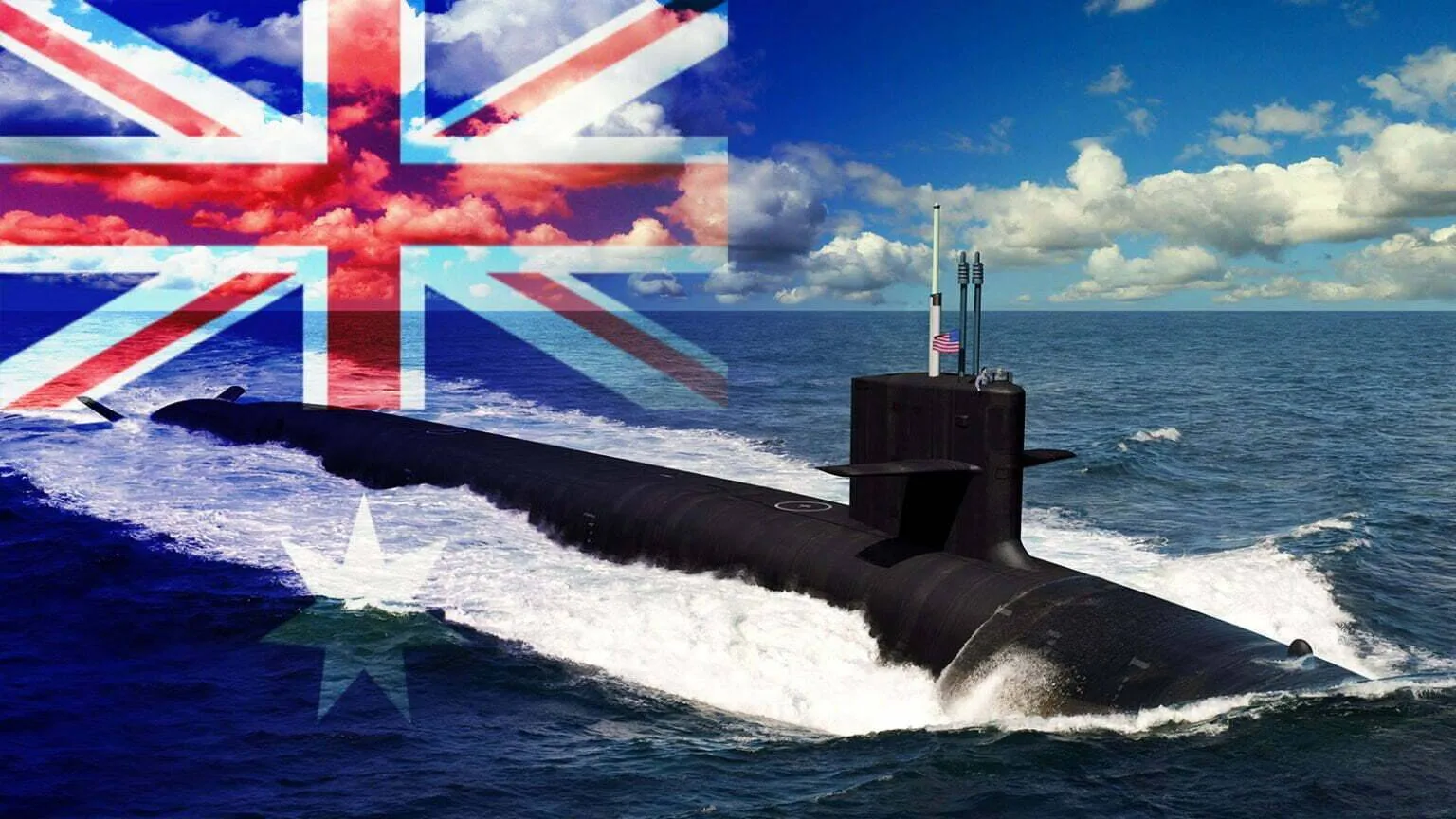A Untied States official dubbed the move the “biggest strategic step Australia has taken in generations.”
In a significant expansion and deepening of relations between the United States, the United Kingdom and Australia, the three nations have signed a new joint security agreement that will make nuclear-powered submarine technology available to Australia for the first time.
The deal, which could potentially alter the future strategic balance in the Pacific, should eliminate a current purchase of high-value Australian submarines from France. Now known as “AUKUS” – for Australia, the United Kingdom, the United States – the deal was formally announced via a Wednesday evening virtual meeting with Australian Prime Minister Scott Morrison, British Prime Minister Boris Johnson and US President Joe Biden. .
“The future of each of our countries, and indeed of the entire world, depends on a free and open Indo-Pacific region,” Biden said. “It’s about investing in our greatest source of strength, our alliances, and renewing them to better meet the threats of today and tomorrow.”
The agreement will “bring our seafarers, our scientists and our industry together to maintain and develop our lead and military capabilities” on key technologies, added Biden.
In a background call with reporters, a couple of senior Biden administration officials said the deal would cover a range of security technologies and policies, including what one official called a “new architecture” of meetings and engagements. . among senior defence and foreign policy officials, one that represents “the greatest strategic step Australia has taken in generations.”
On the technological front, the agreement will also include efforts to “stimulate cooperation in many new and emerging fields: cyber AI, in particular applied AI, quantum technologies and some underwater capabilities as well,” said declared the responsible. “We will also work to support and deepen the sharing of information and technology, and I think you will see a much more dedicated effort to continue the integration of scientific technology related to security and defence, bases industry and supply chains. “
The official added that “it will be a sustained effort for many years to see how we can get married and combine some of our independent and individual abilities into a greater tripartite commitment as we progress.”
US officials stressed the trilateral nature of the deal, saying the historical ties between all three countries are critical, especially as the UK has expressed its desire to focus more on the Pacific in a post-Brexit world.
“This is intended not only to strengthen our capabilities in the Indo-Pacific region, but also to link Europe, and in particular the UK, closer to our strategic aspirations for the region as a whole,” said the first official. “The UK is very focused on the concept of” Global Britain “, it is about engaging much deeper in the Indo-Pacific, and this is an advance on that effort.”
The obvious reason for greater involvement in the Pacific, of course, is to oppose China, which US officials speak openly as the greatest strategic threat for the future. However, officials, who spoke behind reporters before the announcement, constantly avoided attempts to get them to recognize that this new deal is about Beijing.
“I just want to make it very clear that this partnership is not country specific,” said the official. “It is about pursuing our strategic interests, upholding the rules-based international order, and promoting peace and stability in the Indo-Pacific.”
Notably, none of the three world leaders who spoke that evening mentioned China in their remarks.
Sharing technical information, executing legal policies and reviews, and basic budgeting and training planning may have involved several hundred people in the three countries, as well as potentially interested partners and allies. Keeping calm so far is a nice achievement, said Brett Sadler of the Heritage Foundation.
“I think the first thing is congratulations – Bravo Zulu – to all those involved who were able to keep it a secret,” said Sadler, a former submarine that served in the Pacific.
We All Live In New Nuclear Submarines
What raises the most eyebrows in the announcement is the decision that the US and UK will share nuclear propulsion capabilities for Australian submarines. The official called this a “unique” set of circumstances that will see Australia become the only country other than the UK with which America shares this technology.
“We will begin a trilateral 18-month effort involving teams – technical, strategic and naval teams from all three countries – to identify the optimal path to deliver this capability,” the official said.
The official stressed that this was a “one-time” situation and “exception” to US policy and that there was currently no plan to share nuclear capabilities with other nations.
The three leaders stressed that the submarines in question will be armed in a conventional manner, with Morrison stating categorically that Australia “is not seeking to acquire nuclear weapons or establish a civilian nuclear capability” and that it remains committed to its nuclear weapons. long-standing nuclear non-proliferation goals.
The addition of nuclear submarines for Australia could change the geopolitical situation in the region, as pointed out by a senior administration official, who said, “I really want to emphasize that this will give Australia the opportunity for its submarines to largely be deployed for longer periods.” … They are quieter. They are much more capable. They will enable us to maintain and improve deterrence in the Indo-Pacific. ”
“This will allow Australia to play at a much higher level and expand American skills that will be similar,” the official later said.
Sadler seemed to agree, saying that “the biggest impact on US and allied military operations in the Pacific is likely to be the addition of relatively stealthy Australian nuclear submarines for reconnaissance purposes. As Cold War aficionados know, nuclear submarines are great for reconnaissance and intelligence gathering, they can do what diesel submarines cannot because they have to surface from time to time. “
This could free up US submarines for offensive operations in the event of war or at least give allies more flexibility in day-to-day operations, Sadler noted.
Naval Operations Chief Admiral Michael Gilday, speaking to reporters Wednesday from the International Seapower Symposium in Rhode Island, declined to comment beyond asking questions about the submarine deal to the National Security Council.
A Snub to Paris?
Australia is currently under contract with French company Naval Group to produce 12 next-generation submarines, but according to a Financial Review report, the Morrison government plans to tear up that 2016 deal – which has become a headache for rising costs and local industry concerns – and focus on American nuclear supply.
Euan Graham, senior IISS Shangri-La Dialogue Fellow for Asia-Pacific Security, noted that there will be financial repercussions, likely “several hundred million dollars”, for Australia’s cancellation of the French deal. And, he notes, “French-Australian relations will take a hit”, with Paris likely to be especially unhappy to see London take its place as an industrial partner.
But in the end, as Graham said, “the big consequence of this failure is not Anglo’s triumph over Franco’s relationship. Rather, it is a triumph of strategic imperatives over economic imperatives in Australian defence procurement. “
Perhaps not coincidentally, Biden used part of his short remarks to praise France’s efforts in the region, saying Paris “in particular, already has a substantial Indo-Pacific presence as a key partner and ally in strengthening the region’s security and prosperity The United States looks forward to working closely with France and other key countries as we go forward.”
The question now is timing. Sadler believes it could take a decade or more for the system to become available. And the US official signalled that nothing could move that fast, stating that Australia “has no nuclear infrastructure inland, they have made a strong commitment to go in that direction. This will be a sustained effort over the years. “
Morrison in his comments promised that the submarines would be “built” in Adelaide, while Johnson claimed the work would result in “hundreds” of highly skilled jobs in the UK. The UK Prime Minister also stated that work on the program would take “decades”.
According to Graham, an extension of the lifespan of the Royal Navy’s existing Collins-class submarines is likely to be required.
“The question remains whether the can bring the new nuclear ships online later this decade. Otherwise, there is a risk that this seemingly radical solution will only repeat the same mistakes of the previous program. Sometimes Australia is his own worst enemy in his relentless pursuit of the perfect (“regionally superior”) rather than the good. “







